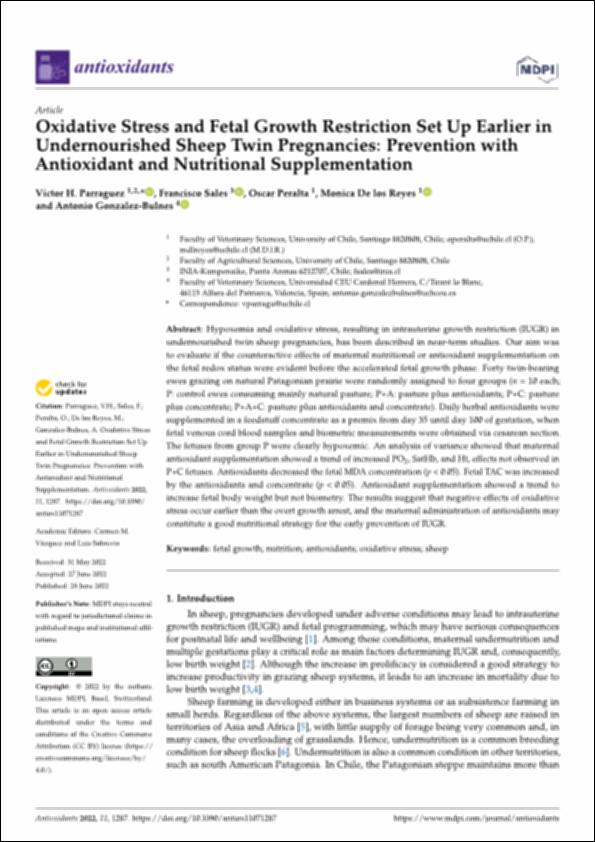Please use this identifier to cite or link to this item:
http://hdl.handle.net/10637/14274Oxidative stress and fetal growth restriction set up earlier in undernourished sheep twin pregnancies prevention with antioxidant and nutritional supplementation
| Title: | Oxidative stress and fetal growth restriction set up earlier in undernourished sheep twin pregnancies prevention with antioxidant and nutritional supplementation |
| Authors : | Parraguez Gamboa, Víctor H. Sales Zlatar, Francisco Peralta Troncoso, Óscar Alejandro Reyes Solovera, Mónica de los González de Bulnes López, Antonio |
| Keywords: | Dietética veterinaria.; Dietetics (Veterinary); Nutrición animal.; Animal nutrition.; Ovejas - Alimentación.; Sheep - Feeding and feeds.; Oxidative stress.; Antioxidants.; Gestación.; Pregnancy.; Ovejas - Cría y explotación.; Sheep - Breeding.; Estrés oxidativo.; Antioxidantes. |
| Publisher: | MDPI |
| Citation: | Parraguez, V. H., Sales, F., Peralta, O., De Los Reyes, M. & Gonzalez-Bulnes, A. (2022). Oxidative stress and fetal growth restriction set up earlier in undernourished sheep twin pregnancies: prevention with antioxidant and nutritional supplementation. Antioxidants, vol. 11, i. 7 (28 jun.), art. 1287. DOI: https://doi.org/10.3390/antiox11071287 |
| Abstract: | Hypoxemia and oxidative stress, resulting in intrauterine growth restriction (IUGR) in undernourished twin sheep pregnancies, has been described in near-term studies. Our aim was to evaluate if the counteractive effects of maternal nutritional or antioxidant supplementation on the fetal redox status were evident before the accelerated fetal growth phase. Forty twin-bearing ewes grazing on natural Patagonian prairie were randomly assigned to four groups (n = 10 each; P: control ewes consuming mainly natural pasture; P+A: pasture plus antioxidants; P+C: pasture plus concentrate; P+A+C: pasture plus antioxidants and concentrate). Daily herbal antioxidants were supplemented in a feedstuff concentrate as a premix from day 35 until day 100 of gestation, when fetal venous cord blood samples and biometric measurements were obtained via cesarean section. The fetuses from group P were clearly hypoxemic. An analysis of variance showed that maternal antioxidant supplementation showed a trend of increased PO2, SatHb, and Ht, effects not observed in P+C fetuses. Antioxidants decreased the fetal MDA concentration (p < 0.05). Fetal TAC was increased by the antioxidants and concentrate (p < 0.05). Antioxidant supplementation showed a trend to increase fetal body weight but not biometry. The results suggest that negative effects of oxidative stress occur earlier than the overt growth arrest, and the maternal administration of antioxidants may constitute a good nutritional strategy for the early prevention of IUGR. |
| Description: | Este artículo se encuentra disponible en la siguiente URL: https://www.mdpi.com/2076-3921/11/7/1287 Este artículo de investigación pertenece al número especial "Oxidative Stress, Pregnancy and Pregnancy-Related Diseases". |
| URI: | http://hdl.handle.net/10637/14274 |
| Rights : | http://creativecommons.org/licenses/by/4.0/deed.es |
| ISSN: | 2076-3921 (Electrónico) |
| Language: | es |
| Issue Date: | 28-Jun-2022 |
| Center : | Universidad Cardenal Herrera-CEU |
| Appears in Collections: | Dpto. Producción y Sanidad Animal, Salud Pública Veterinaria y Ciencia y Tecnología de los Alimentos |
Items in DSpace are protected by copyright, with all rights reserved, unless otherwise indicated.


